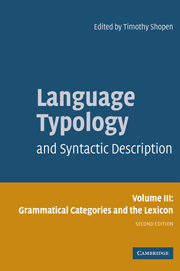Book contents
- Frontmatter
- Contents
- List of figures
- List of tables
- List of contributors
- Acknowledgements
- List of abbreviations and symbols
- 1 Typological distinctions in word-formation
- 2 Lexical typologies
- 3 Inflectional morphology
- 4 Gender and noun classes
- 5 Aspect, tense, mood
- 6 Lexical nominalization
- Bibliography
- Language index
- Subject index
3 - Inflectional morphology
Published online by Cambridge University Press: 29 December 2009
- Frontmatter
- Contents
- List of figures
- List of tables
- List of contributors
- Acknowledgements
- List of abbreviations and symbols
- 1 Typological distinctions in word-formation
- 2 Lexical typologies
- 3 Inflectional morphology
- 4 Gender and noun classes
- 5 Aspect, tense, mood
- 6 Lexical nominalization
- Bibliography
- Language index
- Subject index
Summary
Introduction
The prototypical inflectional categories include number, tense, person, case, gender, and others, all of which usually produce different forms of the same word rather than different words. Thus leaf and leaves, or write and writes, or run and ran are not given separate headwords in dictionaries. Derivational categories, in contrast, do form separate words, so that leaflet, writer, and rerun will figure as separate words in dictionaries. In addition, inflectional categories do not in general alter the basic meaning expressed by a word; they merely add specifications to a word or emphasize certain aspects of its meaning. Leaves, for instance, has the same basic meaning as leaf, but adds to this the specification of multiple exemplars of leaves. Derived words, by contrast, generally denote different concepts from their base: leaflet refers to different things from leaf; and the noun writer calls up a somewhat different concept from the verb to write.
That said, finding a watertight cross-linguistic definition of ‘inflectional’ which will let us classify every morphological category as either inflectional or derivational is not easy. Nor can ‘inflectional’ be defined simply by generalizing over attested inflectional systems or paradigms; the cross-linguistic variation in both forms and categories is too great. Rather, we define inflection as those categories of morphology that are regularly responsive to the grammatical environment in which they are expressed. Inflection differs from derivation in that derivation is a lexical matter in which choices are independent of the grammatical environment.
Information
- Type
- Chapter
- Information
- Language Typology and Syntactic Description , pp. 169 - 240Publisher: Cambridge University PressPrint publication year: 2007
Accessibility standard: Unknown
Why this information is here
This section outlines the accessibility features of this content - including support for screen readers, full keyboard navigation and high-contrast display options. This may not be relevant for you.Accessibility Information
- 123
- Cited by
